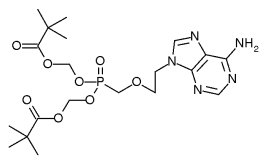Gilead Sciences, Inc. (Nasdaq:GILD), Foster City, Calif. has announced that the European Union's Committee for Proprietary Medicinal Products (CPMP), the scientific committee of the European Medicines Evaluation Agency (EMEA), has recommended granting Marketing Authorisation for Hepsera(TM) (adefovir dipivoxil) for the treatment of chronic hepatitis B in all 15 member states of the European Union. On the basis of the CPMP's recommendation, the European Commission will consider granting final Marketing Authorisation, which is anticipated to occur by mid-2003. The Icelandic and Norwegian authorities are expected to grant corresponding national authorisations within 30 days of receiving the final commission decision. The U.S. Food and Drug Administration cleared Hepsera for marketing in the United States in September 2002.
Gilead submitted a Marketing Authorisation Application (MAA) for Hepsera on March 26, 2002 under the centralized procedure, with the French authorities serving as rapporteur and the Danish authorities acting as co-rapporteur.
The indication for Hepsera recommended by the CPMP is for the treatment of chronic hepatitis B in adults with compensated liver disease with evidence of active viral replication, persistently elevated serum alanine aminotransferase (ALT) levels and histological evidence of active liver inflammation and fibrosis; or decompensated liver disease.
Worldwide, there are approximately 350 million chronic carriers of hepatitis B, of which approximately one million die each year from complications of the disease including cirrhosis (scarring of the liver), liver failure and hepatocellular carcinoma (primary liver cancer). In Western Europe alone, approximately four million people are believed to have chronic hepatitis B. Between one quarter and one third of people with chronic hepatitis B are expected to develop progressive liver disease. Many chronic hepatitis B patients in need of treatment are not able to use currently available drugs due to treatment-related complications including lamivudine-resistance and contraindications for or side effects from interferon alfa-2b.
"Hepsera is a breakthrough for the majority of chronic hepatitis B patients whose condition is inadequately managed by therapies now on the market," explained Patrick Marcellin, MD, Service d'Hepatologie, Hopital Beaujon, Clichy and Professor, Universite Paris VII, Paris, France. "Hepsera's overall efficacy, safety and resistance profiles makes it a much-needed option for physicians and their patients with chronic hepatitis B."
"We are pleased that the regulatory review of Hepsera in Europe is progressing so rapidly," said John C. Martin, PhD, president and CEO, Gilead Sciences. "We believe this demonstrates the significant need for new therapies to treat patients in Europe suffering from chronic hepatitis B, and we will continue to work with the EMEA in order to advance Hepsera toward approval."
About Hepsera
Hepsera, the first nucleotide analogue for chronic hepatitis B, is administered as a once daily 10 mg tablet and works by blocking hepatitis B virus (HBV) DNA polymerase, an enzyme involved in the replication of the virus in the body.
Two placebo-controlled studies and a number of additional studies have evaluated Hepsera in a wide range of patients. The placebo-controlled studies included patients with compensated liver function and either "e" antigen-positive (HBeAg-positive) or "e" antigen-negative (HBeAg-negative, or precore mutant) chronic hepatitis B. Precore mutant hepatitis B infects up to approximately 50 percent of chronic hepatitis B carriers worldwide, and is most prevalent in countries of the Mediterranean and Southeast Asia, where between 30 and 80 percent of chronic hepatitis B patients are estimated to be infected with this strain. Patients infected with this strain of hepatitis B may be predisposed to more severe and progressive liver injury. The drug also has been studied in patients who were treated with and developed resistance to lamivudine, including patients wait-listed for or who had received a liver transplant and patients co-infected with HIV.
In clinical studies, Hepsera treatment demonstrated benefit based on a number of key clinical markers including improvement in liver histology, regression and decreased progression of fibrosis, reduction in serum HBV DNA levels, increased rates of seroconversion and normalization of ALT levels as compared to placebo in treatment-naive patients and in patients with prior interferon experience.
The adverse reactions considered at least possibly related to treatment in the first 48 weeks of treatment were asthenia (weakness), headache, abdominal pain, nausea, flatulence, diarrhea and dyspepsia. With extended treatment, mild to moderate increases in serum creatinine were observed uncommonly in patients with chronic hepatitis B and compensated liver disease treated with Hepsera for a median of 49 weeks and a maximum of 109 weeks. Changes in serum creatinine were observed very commonly in patients with pre- and post-transplantation lamivudine-resistant liver disease and multiple risk factors for changes in renal function who were treated with Hepsera for up to 129 weeks, with a median time on treatment of 19 and 56 weeks, respectively. Clinical and laboratory evidence of exacerbations of hepatitis have occurred after discontinuation of treatment with Hepsera. Special warnings and precautions for use are included in the Summary of Product Characteristics regarding monitoring of renal function and post-treatment exacerbations of hepatitis, use in patients with underlying renal impairment or patients co-infected with HIV, and occurrence of nucleoside analogue-associated lactic acidosis and severe hepatomegaly with steatosis.
Access to Hepsera
In July 2002, Gilead initiated an early access program to provide Hepsera to chronic hepatitis B patients with lamivudine-resistant virus. To date, nearly 1,000 patients have enrolled in Hepsera early access programs in France, Greece (where the incidence of precore mutant hepatitis is especially high), Spain, Portugal, Germany, the United Kingdom, Canada and Australia. Programs will begin soon in Italy and Ireland. The Hepsera early access programs will continue until the drug is commercially available to patients in those areas.
Gilead Sciences
Gilead Sciences is a biopharmaceutical company that discovers, develops and commercializes therapeutics to advance the care of patients suffering from life-threatening diseases worldwide. The company has six marketed products and focuses its research and clinical programs on anti-infectives. Headquartered in Foster City, CA, Gilead has operations in the United States, Europe and Australia.
For more information, visit http://www.gilead.com or call 1-800-GILEAD-5 (1-800-445-3235) or 1-650-574-3000.
COPYRIGHT 2003 Worldwide Videotex
COPYRIGHT 2003 Gale Group



